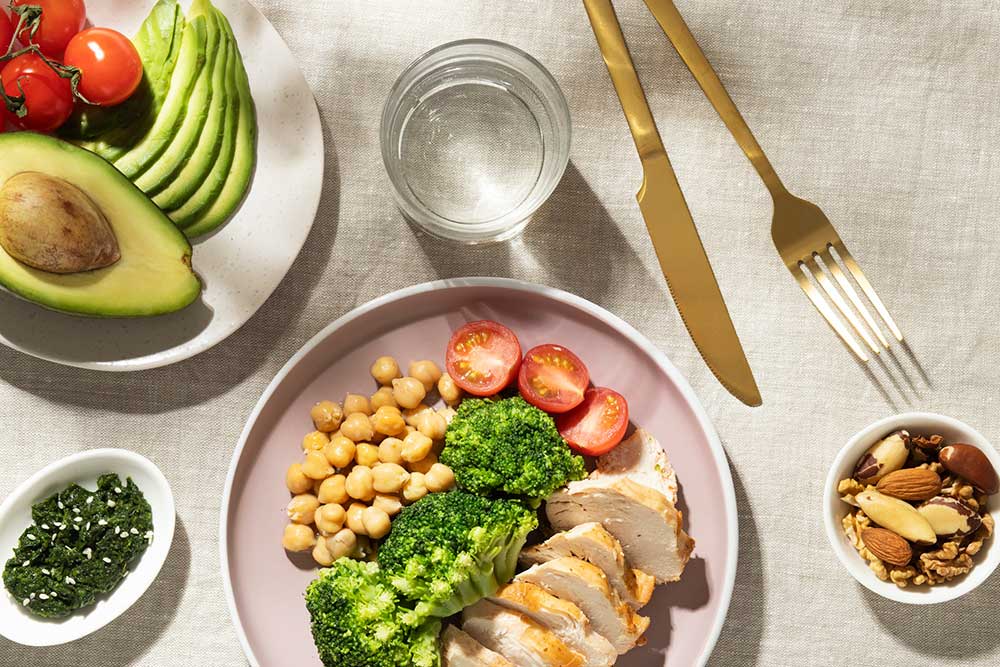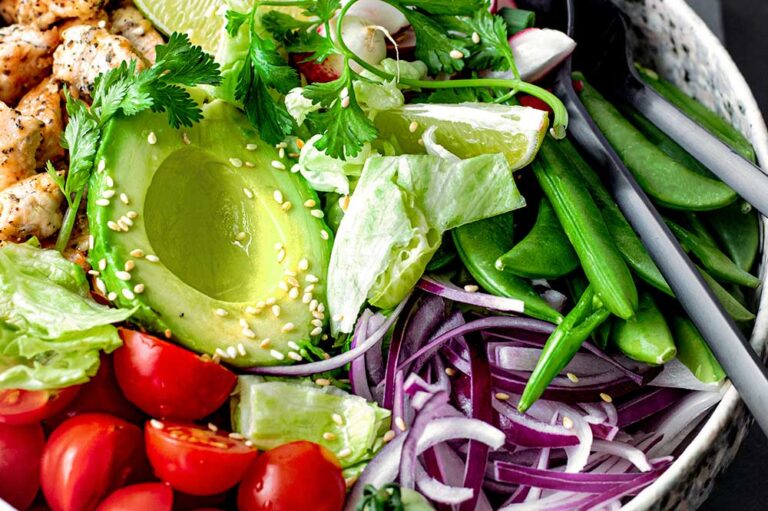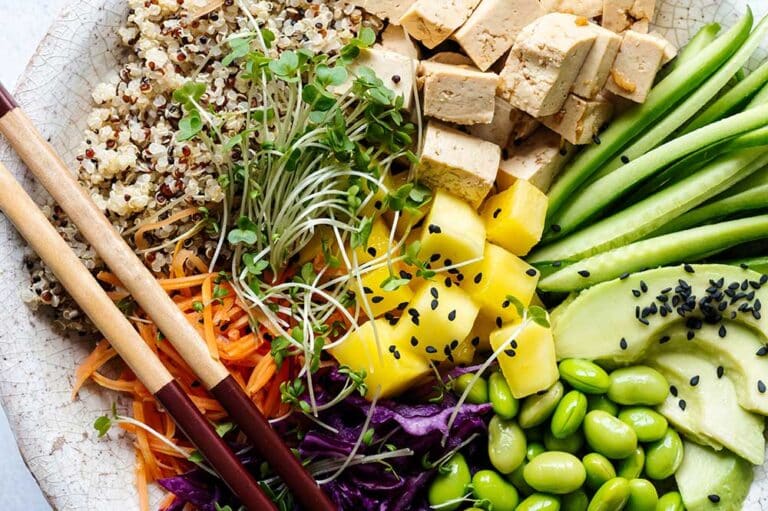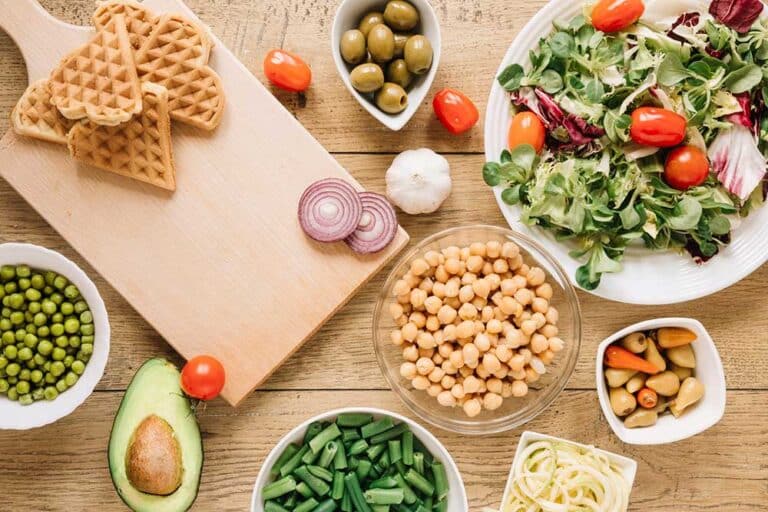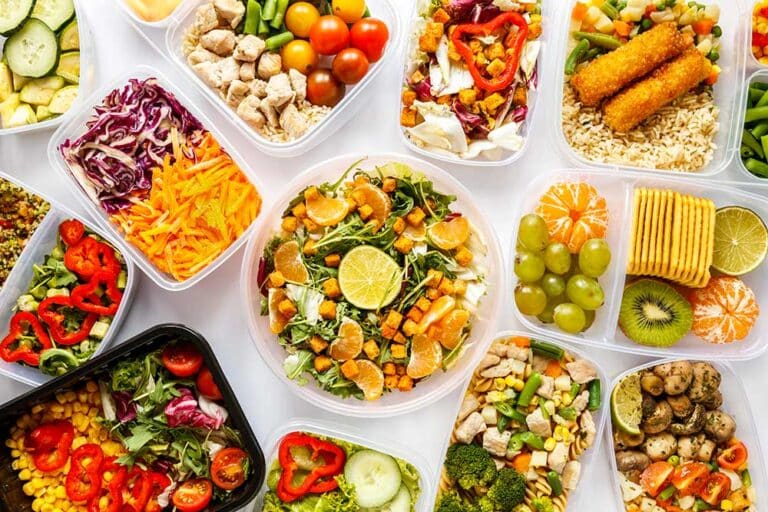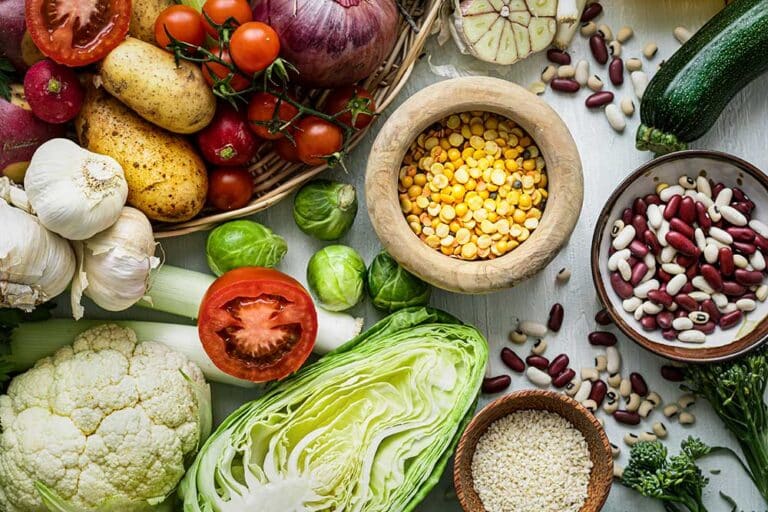Benefits of a Plant-Based Diet
A plant-based diet offers a wide range of health benefits. Here, we explore how a plant-centric eating pattern can improve the immune system and reduce inflammation.
Improved Immune System
A plant-based diet can significantly strengthen the immune system. Essential nutrients in plant foods help keep cells healthy, ensuring the immune system functions optimally.
Key nutrients such as vitamins A, C, and E, along with various antioxidants found in fruits and vegetables, play a crucial role in bolstering the body’s defense mechanisms. These nutrients help protect against germs and microorganisms, reducing the likelihood of infections and diseases.
| Nutrient | Function | Food Sources |
|---|---|---|
| Vitamin A | Supports immune health | Carrots, sweet potatoes, spinach |
| Vitamin C | Protects against immune deficiencies | Oranges, strawberries, bell peppers |
| Vitamin E | Acts as an antioxidant | Almonds, sunflower seeds, spinach |
Consistently consuming a diverse range of plant-based foods can lead to a robust and resilient immune system. For more on how to start a plant-based lifestyle, visit our guide on how to start a plant-based diet.
Reduced Inflammation
One of the significant benefits of a plant-based diet is its ability to reduce inflammation in the body. Plant foods contain various compounds that help neutralize toxins and reduce damage to cells and tissues. Prolonged inflammation can lead to cancers and other inflammatory diseases (MD Anderson).
Plant-based foods are rich in antioxidants and phytonutrients that combat inflammation. These bioactive compounds help resolve inflammation by neutralizing free radicals and supporting cell repair.
| Anti-Inflammatory Compounds | Function | Food Sources |
|---|---|---|
| Antioxidants | Neutralize free radicals | Berries, leafy greens, nuts |
| Omega-3 Fatty Acids | Reduce inflammatory markers | Flaxseeds, chia seeds, walnuts |
| Polyphenols | Protect cells from oxidative stress | Green tea, dark chocolate, grapes |
Including a variety of colorful fruits, vegetables, nuts, and seeds in your diet can significantly reduce inflammation levels. Explore our plant-based diet recipes for delicious meal ideas rich in anti-inflammatory foods.
By improving the immune system and reducing inflammation, a plant-based diet can contribute to long-term health and well-being. For more benefits of plant-based eating, visit our article on the benefits of plant-based eating.
Plant-Based Diet for Disease Prevention
A plant-based diet offers numerous benefits for overall health, including the prevention of various diseases. This section explores how a diet rich in plant foods can reduce the risk of cancer, heart disease, and diabetes.
Cancer Risk Reduction
Eating a plant-based diet can help reduce the risk of cancer by supporting the immune system, reducing inflammation, helping maintain a healthy weight, and providing essential fiber. According to MD Anderson, the anti-inflammatory properties found in plant foods can help lower cancer risk. Fiber-rich foods like fruits and vegetables aid in maintaining a healthy digestive system, which plays a crucial role in cancer prevention.
Heart Disease Prevention
People who followed a plant-based diet rich in vegetables, fruits, whole grains, legumes, and nuts had a significantly lower risk of developing heart disease compared to individuals following non-plant-based diets. However, plant-based diets containing less nutritious foods may slightly increase the risk of heart disease. Key nutrients like antioxidants and fiber found in whole plant foods contribute to better heart health by reducing cholesterol levels and improving blood pressure.
Diabetes Management
Adopting a whole-foods, plant-based diet has been shown to reduce the risk of developing diabetes. Individuals adhering to a healthy plant-based eating pattern had a 34% lower risk of developing diabetes compared to those following unhealthy, non-plant-based diets (Healthline). Foods rich in fiber, such as legumes, whole grains, and vegetables, help regulate blood sugar levels and improve insulin sensitivity.
To discover more about the benefits of plant-based eating, or to start your journey with plant-based diet recipes and plant-based diet for beginners, follow the provided links.
Transitioning to a Plant-Based Diet
Switching to a plant-based diet can be a rewarding endeavor for optimal health benefits. However, there are certain pitfalls to avoid and essential strategies to follow for a successful transition.
Common Mistakes to Avoid
When transitioning to a plant-based diet, it’s important to be aware of some common missteps to ensure a smooth and healthy switch:
-
Relying on Processed Plant-Based Foods: While meat-free prepared foods and packaged options are convenient, they can be highly processed and contain added salt, sugar, saturated fat, and unwanted additives. Prioritize whole, nutrient-dense foods over processed options.
-
Protein Misunderstanding: Concerns about protein deficiency are common but unfounded when a well-planned plant-based diet is followed. Include a variety of plant protein sources such as beans, peas, lentils, nuts, seeds, soy foods, and whole grains to meet your protein needs (Food Revolution). For more information, visit plant-based diet protein sources.
-
Nutrient Oversights: Some essential nutrients may require supplementation. Vitamins B12, D, Omega-3s, Iodine, Iron, and Vitamin K2 are crucial. Use plant-based vitamins or vegan supplements, especially for B12.
-
Limited Variety: A diverse range of plant foods is key for optimal nutrition and gut health. Ensure a mix of vegetables, legumes, fruits, whole grains, seeds, nuts, and mushrooms in your daily diet.
Planning a Balanced Plant-Based Menu
Creating a balanced meal plan is essential for a successful plant-based diet. Here are the steps to ensure it is nutrient-rich and satisfying:
Building a Balanced Plate
A well-rounded plant-based meal should include:
- Proteins: Beans, peas, lentils, tofu, tempeh, seitan, and legume-based pastas.
- Complex Carbohydrates: Whole grains like quinoa, brown rice, oats, and barley.
- Healthy Fats: Avocado, nuts, seeds, tahini, and olive oil.
- Fiber-Rich Foods: A mix of vegetables, fruits, and legumes for digestive health.
- Hydration: Consuming enough water, herbal teas, and nutrient-dense smoothies.
| Food Group | Examples |
|---|---|
| Proteins | Lentils, tofu, chickpeas, tempeh |
| Complex Carbs | Brown rice, quinoa, whole wheat pasta |
| Healthy Fats | Avocado, walnuts, flaxseeds |
| Fiber-Rich Foods | Spinach, berries, black beans |
| Hydration | Water, herbal tea, green smoothies |
Meal Planning Tips
-
Variety is Key: Try experimenting with different plant foods and new plant-based diet recipes to keep meals exciting.
-
Prepping Ahead: Prepare ingredients in bulk such as chopping vegetables, cooking beans, and making sauces to save time during busy weekdays.
-
Nutrient-Dense Snacks: Keep healthy snacks like fruits, nuts, and homemade energy bars on hand to curb hunger between meals.
-
Daily Check: Ensure daily meals cover all essential food groups, protein sources, and hydration needs.
For more detailed meal planning tips and a 7-day meal plan overview, consider incorporating diverse, nutrient-dense foods into your routine and exploring different flavors and textures that plant-based eating offers.
By avoiding common mistakes and following a well-structured, balanced plant-based menu, transitioning can become a rewarding and healthful journey.
Plant-Based Diet Meal Planning
7-Day Meal Plan Overview
Creating a structured plan is essential for anyone looking to adopt a plant-based diet. Below is a 7-day plant-based meal plan designed for a 1,500-calorie intake. This plan can be modified to 2,000 calories for those with higher caloric needs. The focus is on minimally processed foods and balanced nutrition to support optimal health.
| Day | Breakfast | Lunch | Dinner | Snacks |
|---|---|---|---|---|
| Monday | Oatmeal with berries and flaxseeds | Quinoa salad with mixed veggies | Lentil stew with brown rice | Apple slices with almond butter |
| Tuesday | Smoothie with spinach, bananas, and chia seeds | Chickpea wrap | Grilled tofu with roasted veggies | Mixed nuts |
| Wednesday | Avocado toast with whole grain bread | Spinach and tofu salad | Black bean tacos | Carrot sticks with hummus |
| Thursday | Chia pudding with fresh fruit | Vegetable stir-fry | Spaghetti with marinara and broccoli | Fresh fruit |
| Friday | Whole grain cereal with almond milk | Lentil soup with a side salad | Quinoa and veggie bowl | Edamame |
| Saturday | Banana pancakes with maple syrup | Falafel wrap in whole grain pita | Stuffed bell peppers with quinoa | Trail mix |
| Sunday | Scrambled tofu with spinach | Sweet potato and black bean chili | Eggplant parmesan | Smoothie bowl |
To adjust for a 2,000-calorie intake, consider adding more snacks or increasing the portions of each meal. For those who like cooking, this meal plan offers a variety of plant-based diet recipes.
Nutrient-Dense Food Recommendations
In a plant-based diet, it’s crucial to incorporate nutrient-dense foods to meet all nutritional needs. Below is a list of highly recommended foods that are rich in essential nutrients:
-
Protein Sources
- Beans and Lentils: Rich in protein and fiber. Examples include black beans, chickpeas, and red lentils.
- Nuts and Seeds: Packed with healthy fats and protein. Examples include almonds, chia seeds, and pumpkin seeds.
- Whole Grains: Such as quinoa, brown rice, and farro are excellent sources of protein and complex carbohydrates.
-
Healthy Fats
- Avocados: High in monounsaturated fats and essential nutrients.
- Nuts and Nut Butters: Almond butter and walnut are excellent choices for healthy fats and protein.
- Olive Oil: Used for cooking and in dressings.
-
Vitamins and Minerals
- Leafy Greens: Spinach, kale, and Swiss chard are rich in vitamins A, C, and K.
- Fruits: Berries, oranges, and bananas provide essential vitamins and antioxidants.
- Cruciferous Vegetables: Broccoli, Brussels sprouts, and cauliflower are nutrient powerhouses.
-
Necessary Supplements
- Vitamin B12: Since B12 is not naturally found in plant foods, supplementation is recommended.
- Iron: To ensure adequate iron intake, consume foods rich in iron alongside vitamin C-rich foods.
- Omega-3 Fatty Acids: Consider algae oil or flaxseed supplements for this essential fat.
| Nutrient | Recommended Food Sources | Additional Notes |
|---|---|---|
| Protein | Beans, lentils, nuts, whole grains | Focus on minimally processed options (EatingWell) |
| Healthy Fats | Avocados, nuts, olive oil | Balance with protein sources for optimized nutrition |
| Vitamins and Minerals | Leafy greens, fruits, cruciferous vegetables | Pair iron-rich foods with vitamin C for better absorption |
| Necessary Supplements | Vitamin B12, Iron, Omega-3 | Consider a multivitamin if necessary |
Implementing a plant-based diet for optimal health can be both enjoyable and nutritious. By following a structured meal plan and incorporating nutrient-dense foods, individuals can reap the numerous plant-based diet benefits, such as improved immunity and reduced inflammation. For those new to this dietary lifestyle, refer to our guide on plant-based diet for beginners to get started.
Essential Nutrients in a Plant-Based Diet
Proper nutrition is crucial for optimal health, especially when following a plant-based diet meal plan. Ensuring that your diet contains all essential nutrients, including protein and important supplements, is vital.
Protein Sources
Protein is a crucial macronutrient essential for muscle repair, enzyme production, and overall body function. There are numerous plant-based sources of protein that can help meet your dietary needs.
| Food | Protein Content (g) per 100g |
|---|---|
| Lentils | 9 |
| Chickpeas | 19 |
| Quinoa | 14 |
| Tofu | 15 |
| Black Beans | 21 |
| Chia Seeds | 17 |
To diversify your protein intake, consider incorporating a variety of these foods into your meals. For more information on protein sources, visit our dedicated article on plant-based diet protein sources.
Necessary Supplements
While a plant-based diet offers numerous health benefits, some essential nutrients might be less readily available. Here are key supplements to consider:
-
Vitamin B12: Needed for red blood cell creation, protein digestion, energy release, and nervous system support. Found mainly in animal products, thus supplementation is often necessary.
-
Iron: Crucial for maintaining energy, reducing tiredness, brain function, and immune system strength. Plant sources like whole grains, dried fruits, leafy greens, nuts, and seeds are good, but their absorption is less efficient than animal sources (DR.VEGAN).
-
Vitamin D: Important for bone health and immune function. It may be challenging to get enough from diet alone, especially in regions with limited sunlight.
-
Omega-3 Fatty Acids: Essential for heart health and brain function. Alpha-linolenic acid (ALA) can be sourced from flaxseeds, chia seeds, and walnuts, but consider supplementing with algae-based Omega-3 for direct DHA and EPA.
-
Iodine: Necessary for thyroid function. Found in sea vegetables and iodized salt.
-
Vitamin K2: Supports bone and cardiovascular health. Fermented foods like natto are a good source.
| Nutrient | Recommended Daily Intake | Plant-Based Sources | Supplementation Needed? |
|---|---|---|---|
| Vitamin B12 | 2.4 µg | Fortified foods | Yes |
| Iron | 8-18 mg | Whole grains, leafy greens | Sometimes |
| Vitamin D | 600 IU | Fortified foods, sunlight | Sometimes |
| Omega-3 (ALA) | 1.1-1.6 g | Flaxseeds, chia seeds | Yes (DHA/EPA) |
| Iodine | 150 µg | Sea vegetables, iodized salt | Sometimes |
| Vitamin K2 | 90-120 µg | Natto, fermented foods | Sometimes |
Ensuring a well-rounded and nutritionally complete diet can involve both dietary choices and the strategic use of supplements. To further understand the benefits of plant-based diets, visit benefits of plant-based eating. For specific product recommendations and meal planning tips, explore our articles on plant-based diet recipes and high protein plant-based foods.
Practical Tips for Plant-Based Living
Transitioning to a plant-based diet can be a rewarding journey towards optimal health. Here are some practical tips for cooking, meal prepping, and ensuring a sustainable transition to a plant-based lifestyle.
Cooking and Meal Prep Suggestions
Cooking and meal prepping can simplify the process of adopting a plant-based diet. Here are some key suggestions:
-
Plan Regular Meal Prep Sessions: Setting aside time twice a week for meal prep can save you significant time and effort. Prepping your meals in advance makes it easier to assemble plant-based plates on busy days (Parkview).
-
Use a Meal Planner: If you need assistance in planning your plant-based meals each week, consider using tools like the Forks Meal Planner. It provides exclusive recipes that take 35 minutes or less to prepare (Forks Over Knives).
-
Healthy Substitutes: Replace animal products with plant-based alternatives. Use plant milks (like oat, almond, or soy) instead of dairy milk. Substitute eggs in baking with flax seed eggs and use tofu scramble as an alternative to scrambled eggs.
-
Cook in Batches: Prepare large quantities of plant-based staples like legumes, grains, and roasted vegetables. Store them in the refrigerator for quick and easy access throughout the week.
-
Stock Up on Essentials: Maintain a well-stocked pantry with essential ingredients such as whole grains, beans, lentils, nuts, seeds, and spices. Having these items available makes it easier to whip up nutritious meals on short notice.
Sustainable Transition Steps
Ensuring a sustainable transition to a plant-based diet involves gradual changes and mindful practices. Here are some steps to consider:
-
Gradual Transition: Start by incorporating more plant-based meals into your current diet. Gradually replace one meal per day with a plant-based option until you feel comfortable eating plant-based at all meals.
-
Educate Yourself: Learn about the benefits of plant-based eating. Educate yourself on the essential nutrients required for a balanced plant-based diet, as well as potential deficiencies and how to address them.
-
Focus on Whole Foods: Emphasize whole, unprocessed foods such as fruits, vegetables, nuts, seeds, oils, whole grains, legumes, and beans. These foods are nutrient-dense and offer high fiber and phytonutrient content (Harvard Health Publishing).
-
Listen to Your Body: Plant-based foods are lower in calories but rich in nutrients. Eat until you are satisfied without feeling restricted or limited (Parkview).
-
Connect with a Community: Join online forums, social media groups, or local meetups focused on plant-based living. Engaging with a supportive community can provide motivation, tips, and recipe ideas.
By incorporating these practical tips, navigating the transition to a plant-based diet can be simpler and more sustainable. For more detailed plant-based diet recipes, explore our dedicated section. Additionally, to understand the nutrient value of high-protein plant-based foods, check out our article on high-protein plant-based foods.
- About the Author
- Latest Posts
Johnnie D. Jackow Sr., the founder and CEO of Total Body Fitness, Worldwide, has a long-standing career in the fitness industry. He began as a certified personal trainer in the mid-90s and soon after authored his first weight loss book in 1998. This led to the launch of Total Body Fitness, Nationwide in the USA at the same time. Johnnie gained recognition as the fitness guru of his time, running infomercials on local TV late at night in Houston, Texas. Over the years, he has helped more than 40,000 individuals from all over the world achieve their health and fitness goals. With over 60,000 hours of documented training in integrative functional medicine, he completed his PhD in human physiology in 2010. His primary objective is to assist people in reaching their health and fitness goals through alternative approaches rather than relying solely on conventional medicine and pharmaceutical drugs. Today, with almost three decades of experience under his belt, Johnnie continues to be a leader in health and fitness.

